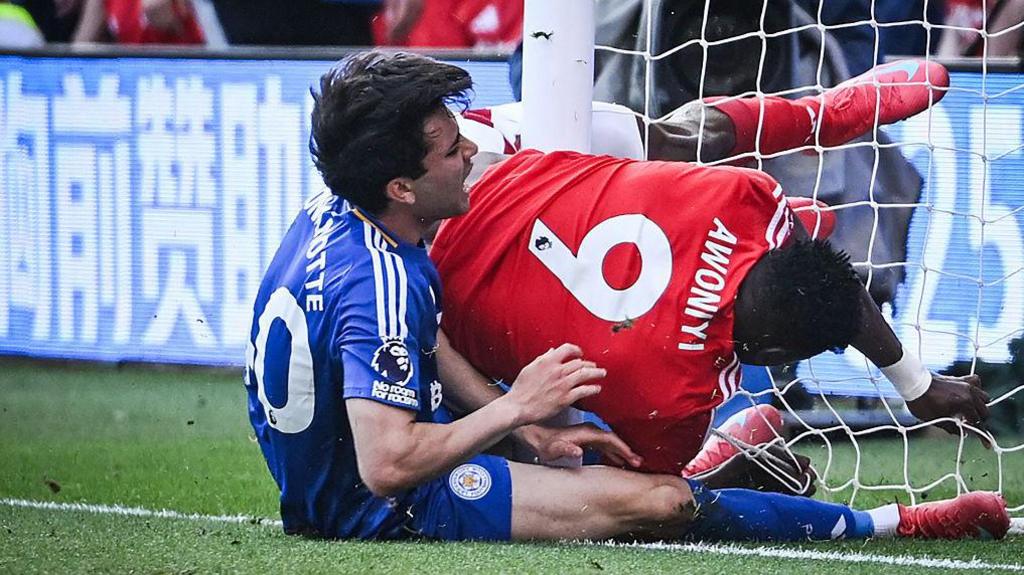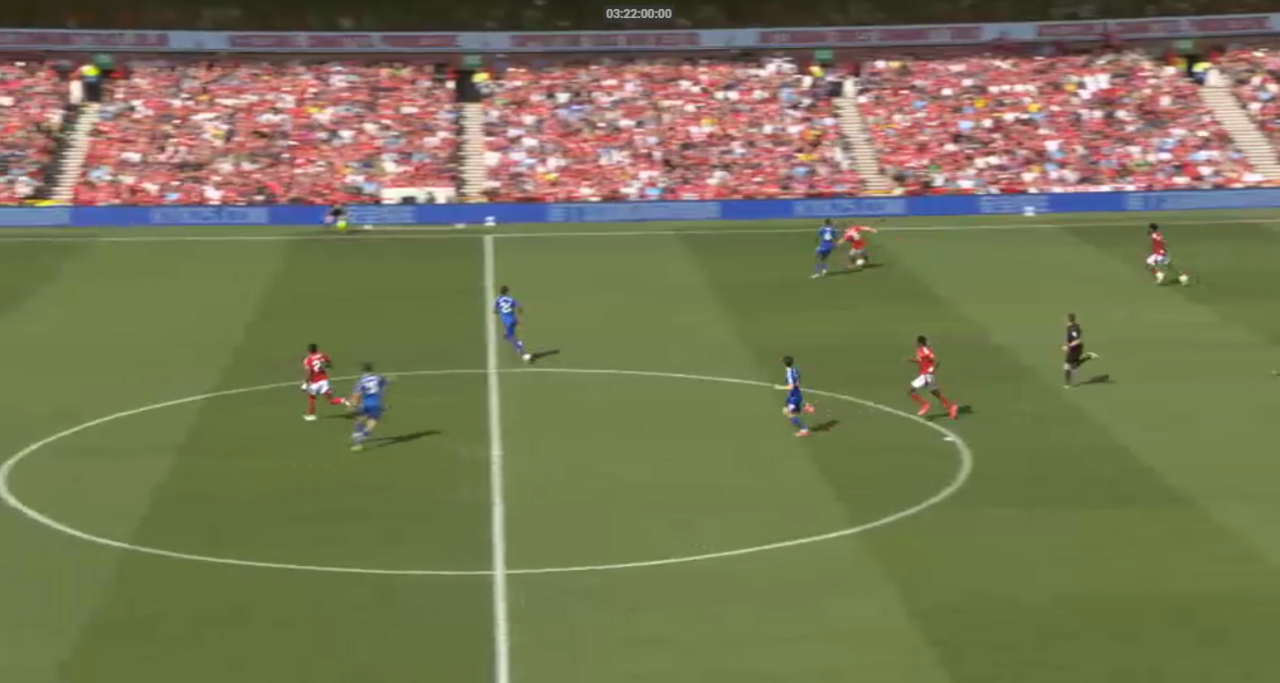Did 'late flag' offside law expose Awoniyi to serious injury?

Taiwo Awoniyi (right) was replaced in the 83rd minute
- Published
The injury suffered by Nottingham Forest striker Taiwo Awoniyi has raised questions about the future of the offside law.
The 27-year-old was placed into an induced coma on Tuesday after requiring surgery on an abdominal injury sustained when he collided with the post in a 2-2 Premier League draw against Leicester City at the City Ground.
Awoniyi was attempting to get on the end of a cross by winger Anthony Elanga.
Sources have told BBC Sport that Awoniyi suffered a ruptured intestine.
He received medical attention for several minutes and had to leave the field after initially attempting to carry on. He was later taken to hospital after his condition worsened.
Forest owner Evangelos Marinakis walked on to the pitch at full-time to speak to manager Nuno Espirito Santo, "frustrated" by the medical team's "misjudgement".
Replays showed Elanga was offside in the build-up to the incident.
The assistant referee followed protocol by allowing the passage of play to continue, but the severity of Awoniyi's injury has raised doubts about the application of the law.

Elanga was in an offside position in the passage of play that led to Awoniyi's injury
What is the law on 'delaying the flag'?
A new protocol on offsides was introduced by the International Football Association Board (IFAB) for the 2020-21 Premier League season.
While the law did not change, assistant referees were told to keep their flag down if they felt there was an immediate goalscoring opportunity.
Once a goal was scored or the passage of play completed, assistant referees would raise their flag to indicate offside.
Should a goal be scored, the video assistant referee (VAR) could then review the offside.
Assistant referees are told to immediately raise their flag for offside if the passage of play is not a clear or immediate goalscoring opportunity, if the passage of play is going to the wing, or if they are certain the attacker is in an offside position and there is no risk of error.
Lawmakers say this allows more goals to be scored as officials do not intervene until the attack is completed.
Although no goal was scored on Sunday, the Professional Game Match Officials Board (PGMOL) would argue the law was applied correctly given it met the criteria set by IFAB.
'Players are exposed to injury'
Former Premier League referee Keith Hackett said players are "exposed to injury" by delaying an offside flag.
"With the introduction of VAR came the process of assistant referees delaying the flag to indicate offside until the outcome - either a goal or possession of the ball by the defence," he told Radio 5 Live.
"This is to ensure where the assistant referee makes an error on an offside decision, it doesn't impact on the goal being ruled out incorrectly. Sadly, this practice does expose the risk to players of injury."
Awoniyi's injury is the most severe incident since the new application of the law was introduced.
In March 2021 Wolves goalkeeper Rui Patricio was carried off on a stretcher following 15 minutes of on-field treatment after he collided with team-mate Conor Coady against Liverpool.
Patricio took a blow to the head as he and Coady attempted to stop Mohamed Salah from scoring. The flag was raised for offside after Salah scored.
Liverpool manager Jurgen Klopp said: "It was an awful situation. It was a proper shock."
In December 2023 Manchester City defender John Stones was sidelined for a month after injuring an ankle in a collision with Everton's Beto.
Three weeks later City goalkeeper Ederson was substituted after colliding with Newcastle's Sean Longstaff. He was sidelined for two weeks.
Following the injury to Ederson, City captain Rodri said: "We have an injury because of this situation we are trying to fix in the last years. It is ridiculous.
"There are lots of injuries in this situation. So we have to check if it's the best option to follow the game."
Will 'ticking time bomb' law change?
The rules of football are set by IFAB and adopted by domestic leagues around the world.
IFAB board - made up of the English, Scottish, Welsh and Northern Irish Football Associations and Fifa - meets twice a year.
Typically, its spring meeting is held to discuss possible changes to the laws.
One-off meetings can be convened if there are emergency issues to discuss or rules that require immediate change.
"When an offside is so clear and obvious I think it is the duty of the assistant referee to put their flag up and stop play," former England women's midfielder Fara Williams told BBC Sport.
"When it is marginal then I get it. We have seen those fine margins with VAR when it is a toe nail to keep them onside.
"In this scenario it happened on the halfway line. This has been a time bomb waiting to go off in terms of someone getting seriously injured. Awoniyi got that horrific injury because of it.
"It should never happen. Fans, players and managers will think that should never happen.
"I am totally against it and I feel most players are as well. It is a rule that nobody likes and I am sure it will be assessed in the summer."
BBC Sport has contacted IFAB for comment.
How Marinakis on-pitch incident unfolded